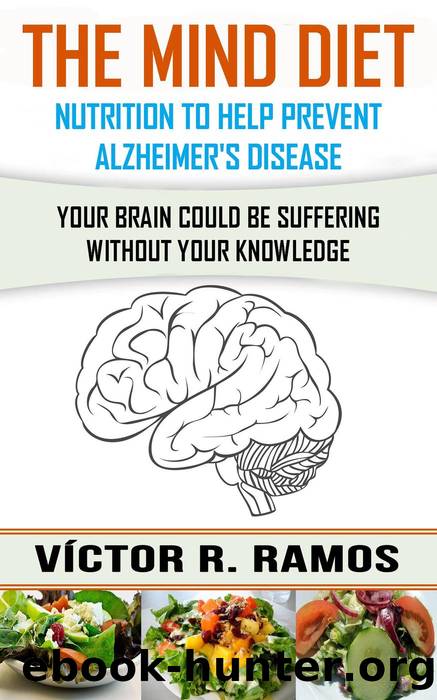The Mind Diet, Nutrition to Help Prevent Alzheimer's Disease by Victor R. Ramos

Author:Victor R. Ramos
Language: eng
Format: epub
Publisher: Babelcube Inc.
Published: 2016-10-24T00:00:00+00:00
Nuts: at least 5 servings per week.
A serving is equivalent to 30g, about a quarter cup.
All types of nuts help lower high blood pressure and LDL cholesterol (bad cholesterol), and protect against type 2 diabetes, which are factors that contribute to memory loss and Alzheimer's disease.
Nuts are a good source of vitamin E.
High levels of vitamin E are associated with less memory loss and greater cognitive activity as we age.
Walnuts seem to be the best nuts for maintaining brain health. Some research suggests that they help improve memory, concentration and the speed the brain processes information; like berries, they provide polyphenols, but they also contain omega-3 fatty acids.
Eating nuts improves the execution of tasks that require motor skills or behaviors in the elderly. They improve the connection between neurons, because theyâre rich in polyphenols and other antioxidants, as neuroscientists from the University of Boston, USA, recently discovered.
Following the MIND dietâs guideline of 30g of nuts decreases the risk of cardiovascular diseases by 30% and especially decreases the chance of a stroke or cerebrovascular accident by 49%, as a Spanish research study found, recently published in The New England Journal of Medicine.
Recent research from the University of Barcelona, published in the Journal of Proteome Research, shows that people who incorporate nuts and almonds into their diets experience a significant increase of serotonin levels within 12 weeks.
Serotonin has many benefits, such as:
-Improves transmission of nerve signals.
-Reduces feelings of hunger.
-Decreases the concentration of substances associated with inflammation.
-Fights abdominal obesity and hypertension.
-Improves cardiac health.
-Puts us in a good mood.
Joe Vinson and his colleagues at the University of Scranton, USA, found that walnuts have the most antioxidants, more than peanuts, pistachios or almonds.
To get visible health benefits, Vinson recommends eating a minimum of 7 walnuts a day, enough to reduce the possibility of diabetes, cardiovascular problems and cancer.
According to recent research published in Neurochemical Research, nuts have protective effects against oxidative stress and cellular death that occurs in the brains of Alzheimer's patients, because they contain alpha-linolenic acid (ALA), an omega-3 fatty acid of plant origin.
Download
This site does not store any files on its server. We only index and link to content provided by other sites. Please contact the content providers to delete copyright contents if any and email us, we'll remove relevant links or contents immediately.
Men In Love by Nancy Friday(5234)
Everything Happens for a Reason by Kate Bowler(4734)
The Immortal Life of Henrietta Lacks by Rebecca Skloot(4576)
Why We Sleep by Matthew Walker(4434)
The Sports Rules Book by Human Kinetics(4379)
Not a Diet Book by James Smith(3411)
The Emperor of All Maladies: A Biography of Cancer by Siddhartha Mukherjee(3148)
Sapiens and Homo Deus by Yuval Noah Harari(3068)
Day by Elie Wiesel(2781)
Angels in America by Tony Kushner(2652)
A Burst of Light by Audre Lorde(2597)
Endless Forms Most Beautiful by Sean B. Carroll(2474)
Hashimoto's Protocol by Izabella Wentz PharmD(2371)
Dirty Genes by Ben Lynch(2313)
Reservoir 13 by Jon McGregor(2300)
Wonder by R J Palacio(2203)
And the Band Played On by Randy Shilts(2197)
The Immune System Recovery Plan by Susan Blum(2057)
Stretching to Stay Young by Jessica Matthews(2037)
